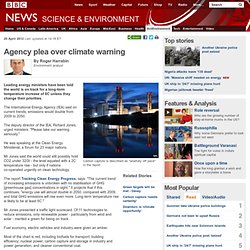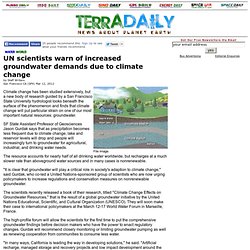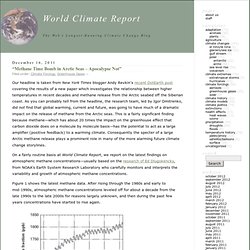

Climate Change 10,000 Times Faster Than Evolution. Evolution can be fast, but not fast enough to keep up with the rate of human-caused climate change, say two researchers who have studied the evolution rates of hundreds of species in the past.

In fact, many vertebrate species would have to speed up their evolution rate 10,000 times to match today's pedal-to-the-metal rate of global warming, according to John Wiens, an ecology and evolutionary biology professor at the University of Arizona, and Ignacio Quintero, a postgraduate research assistant at Yale University. "A big question is 'Can some species adapt quickly enough to survive? '" said Wiens. “So we looked at 17 groups of animals” comprising 540 species that included amphibians, birds, reptile and mammals, to see how they adapted to temperature changes in the past. “We estimated the rate of climate change for these species.”
How Global Warming Will Change Your Life 10 Signs Climate Change Is Already Happening. Global flower trade threatens rare palm. 15 March 2012Last updated at 03:50 ET By Mark Kinver Environment reporter, BBC News Xate palms are popular among florists because the leaves stay green for up to 40 days after being cut Demand for leaves from an endangered palm, found in Central and South America, is threatening the species' long term survival, a study warns.

BBC Nature - Man-made noise affects growth of plants and trees. 21 March 2012Last updated at 11:19 By Victoria Gill Science reporter, BBC Nature.

Agency plea over climate warning. 25 April 2012Last updated at 14:18 ET By Roger Harrabin Environment analyst Carbon capture is described as "woefully off pace" in the report Leading energy ministers have been told the world is on track for a long-term temperature increase of 6C unless they change their priorities.

The International Energy Agency (IEA) said on current trends, emissions would double from 2009 to 2050. China irrigation system responsible for rising emissions, research shows. The irrigation of Chinese farm fields with more water pumped from ever deeper underground is responsible for 33m tonnes of carbon dioxide per year – equivalent to the entire emissions of New Zealand – a new study revealed on Wednesday.

The research, carried out by a team of UK and Chinese scientists, highlights the rising but often overlooked energy and climate costs of irrigating crops in drought-plagued northern China, where farmers have to mine aquifers because surface rivers and lakes are increasingly polluted and over-exploited by factories and cities. The authors found that groundwater used for crop irrigation in China has grown from 10bn cubic metres in 1950 to more than 100bn today. Bioengineer humans to tackle climate change, say philosophers. Earlier this week, The Atlantic ran an eye-catching, disturbing interview with a professor of philosophy and bioethics at New York University called S.

Matthew Liao. He was invited to discuss a forthcoming paper he has co-authored which will soon be published in the journal Ethics, Policy & Environment. Plants Gone Wild: Antarctica Edition. UN scientists warn of increased groundwater demands due to climate change. Climate change has been studied extensively, but a new body of research guided by a San Francisco State University hydrologist looks beneath the surface of the phenomenon and finds that climate change will put particular strain on one of our most important natural resources: groundwater.

SF State Assistant Professor of Geosciences Jason Gurdak says that as precipitation becomes less frequent due to climate change, lake and reservoir levels will drop and people will increasingly turn to groundwater for agricultural, industrial, and drinking water needs. The resource accounts for nearly half of all drinking water worldwide, but recharges at a much slower rate than aboveground water sources and in many cases is nonrenewable. The scientists recently released a book of their research, titled "Climate Change Effects on Groundwater Resources," that is the result of a global groundwater initiative by the United Nations Educational, Scientific, and Cultural Organization (UNESCO).
Scientists and tourists bring thousands of alien seeds into Antarctica. 236na6. Shipping causes 'chronic stress' to whales. 1 in 8 chance of catastrophic solar megastorm by 2020. Solar flares (credit: SOHO/NASA/ESA) The Earth has a roughly 12 percent chance of experiencing an enormous megaflare erupting from the sun in the next decade, according to space physicist Pete Riley, senior scientist at Predictive Science in San Diego, California, writing n Space Weather on Feb. 23.

This event could potentially cause trillions of dollars’ worth of damage and take up to a decade to recover from, according to a 2008 report from the National Research Council. Wash your mouth out with silver. Public release date: 7-Mar-2012 [ Print | E-mail Share ] [ Close Window ]

275na6. World Climate Report » “Methane Time Bomb in Arctic Seas – Apocalypse Not” Our headline is taken from New York Times blogger Andy Revkin’s recent DotEarth post covering the results of a new paper which investigates the relationship between higher temperatures in recent decades and methane release from the Arctic seabed off the Siberian coast.

As you can probably tell from the headline, the research team, led by Igor Dmitrenko, did not find that global warming, current and future, was going to have much of a dramatic impact on the release of methane from the Arctic seas. This is a fairly significant finding because methane—which has about 20 times the impact on the greenhouse effect that carbon dioxide does on a molecule by molecule basis—has the potential to act as a large amplifier (positive feedback) to a warming climate.
Consequently the specter of a large Arctic methane release plays a prominent role in many of the more alarming future climate change storylines. 'Green deal' will fail, government's climate advisers warn. The government's flagship programme to transform the energy efficiency of 14m homes in the next decade will fail and only reach only 2-3m households, according to an unprecedented attack from the government's own climate advisers. The warning comes from the Committee on Climate Change (CCC), which on Tuesday for the first time published an open letter criticising government policy.
Disappearing Arctic Sea Ice & More Powerful Storms? Feb 27, 2012 9:35pm New research suggests disappearing sea ice at the top of the planet is playing a “critical” role in driving colder, snowier winters here in the United States. Retreating Arctic sea ice, according to the researchers, helps alter the atmosphere in two ways. Ancient plants back to life after 30,000 frozen years. 20 February 2012Last updated at 20:35 By Richard Black Environment correspondent, BBC News. Climate change: threats and opportunities to the UK - graphic. Op cuts emissions by 35% The Co-op has cut greenhouse gas emissions 35% on 2006 levels.
Leak exposes how Heartland Institute works to undermine climate science. Openness: A Heartland-warming tale. 15 February 2012Last updated at 21:45. UNEP Releases Foresight Report. 20 February 2012: The UN Environment Programme (UNEP) has released a report titled the “Foresight Report,” which outlines the findings of UNEP's Foresight Process aimed at identifying and ranking the most pressing emerging environmental issues. The report outlines 21 emerging issues and provides governments, civil society and business with scientific assessments to forge a forward-looking outcome at the UN Conference on Sustainable Development (UNCSD, or Rio+20). According to UNEP, the Foresight Panel involved 400 international scientists and experts. Ladybird decline driven by 'invading' harlequin. 7 February 2012Last updated at 01:23 By Richard Black Environment correspondent, BBC News.
BBC Nature - Tiny lizards found in Madagascar. 15 February 2012Last updated at 07:56 By Ella Davies Reporter, BBC Nature. Nserving biodiversity hotspots 'could bring world's poor $500bn a year' UK's last wildlife recording course threatened with closure. The natural world is the litmus paper of the health of our environment. New project to help predict the future of the UK’s coastline. Overhaul of Global Environmental Governance to Meet 21st Century Challenges Tops Emerging Issues Selected by UN Scientific Panel. UK phenology effort 'needs more citizen recorders' Researchers assess effects of a world awash in nitrogen.